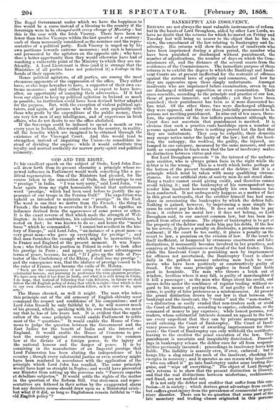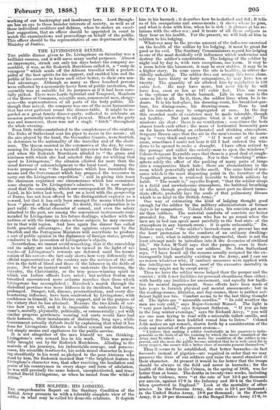BANKRUPTCY AND INSOLVENCY.
RETURNS are not always the most valuable instruments of reform but in the hands of Lord. Brougham, aided by other Law Lords, we have no doubt that the returns for which he moved on Friday and Tuesday last will bring us nearer to the object that he has in view, the amendment of the law relating to Bankruptcy and In- solvency. His returns will show the number of insolvents who have been imprisoned during a given period, the number who have been punished or discharged without punishment, the number of adjudications, the number of days on which the Com- missioners sit, and the distance of the several courts from the residences of the Commissioners. The immediate purpose of these returns is to exhibit the degree to which the Bankrupt and Insol- vent Courts are at present ineffectual for the restraint of offences against the natural laws of equity and commerce, and how far they are oppressive upon those simply unfortunate. Amongst insolvents who are imprisoned before examination, seven in ten are discharged without opposition or even examination. Their cases resemble, according to the principle and practice of our law, those of persons innocent, not culpable ; yet they have been punished ; their punishment has been as it were discounted be- fore trial. Of the other three, two were discharged although they were opposed, and they are thus judicially pronounced to be persons not meriting punishment. In nine out of ten cases, there- fore, the operation of the law inflicts punishment although the Court does not ascertain that punishment is merited. It is obvious that such a practice casts hardships upon a number of persons against whom there is nothing proved but the fact that they are unfortunate. They may be culpable, their demerits may escape notice under the laxity of the law ; but all the heed- less, the unhappy, the reckless, the guilty, the injured, are lumped in one category, measured by the same measure, and sent forth as examples to teach men that the law of insolvency makes no distinction between virtue and vice.
But Lord Brougham proceeds " in the interest of the unfortu- nate creditor, who is always prima facie in the right while the debtor is in the wrong." This is a truth which lurks perhaps at the bottom of the present treatment of the debtor ; but it is a principle which must be taken with many qualifying circum- stances. In our artificial state of society men do not stand alone. Many a trader cannot avoid giving credit, and therefore cannot avoid taking it; and the bankruptcy of his correspondent may render him insolvent however regularly his own business has been conducted. It not unfrequently happens as a matter of fact in this great metropolis, that the creditor himself has had some share in occasioning the bankruptcy by which the debtor falls. Nothing is gained, however, by imprisoning a man simply be- cause he cannot pay his debts. It does not enable him to pay them ; it enforces no moral law ; it does not belong, as Lord Brougham said, to our ancient common law, but has been im- ported from other systems. The object of bankruptcy is to get at the property of the debtor and make him pay his debts. If the law be too severe, it places a penalty on disclosure, a premium on con- cealment; if the court be too costly, it places a penalty on the resort to law, a premium on the evasion of law. If the court be itself inefficient, or hampered by erroneous enactments and false distinctions, it necessarily becomes involved in lax practices, and connives at the recklessnessness or fraud of the bad trader. Thus, while the Insolvent Court is punishing men by imprisonment for offences not ascertained, the Bankruptcy Court is almost daily in the politest manner ushering men back to com- merce who have been positively or constructively guilty of fraud. For the same principle applies in fraud that holds good in homicide.. The man who throws a brick out of window, heedless where it may fall, is guilty of manslaughter if it kill a passenger ; so the man who flings about his credit, and incurs debts under the semblance of regular trading without re- gard to his means of paying them, if not guilty of fraud as a crime, is guilty of false pretences as a misdemeanour. At present the grand distinction drawn by our law is that between the bankrupt and the insolvent, the " trader" and the "non-trader," —a distinction so easily evaded that non-traders seek or avoid the Court of Bankruptcy, according to caprice, calculation, or the command of money to pay expenses ; while honest persons, real i
traders, whose substantial interests demand an appeal to the law, use every expedient that they can by private arrangement to avoid entering the Court of Bankruptcy. The Court of Insol- vency possesses the power of awarding imprisonment for three years ; the Court of Bankruptcy can only withhold the certificate, leaving to the creditor the penal execution of the law. Thus punishment is uncertain and inequitably distributed. Proceed- ings in bankruptcy. release the debtor once for all from responsi- bilities previously incurred ; proceedings in insolvency leave him liable. The liability, is scarcely ever, if ever, enforced ; but it hangs like a clog round the neck of the insolvent, checking his energies in recovery ; and it operates as one reason why insolvents "who can afford it" go into bankruptcy under some trading dis- guise, and "wipe off everything." The object of Lord Brough- am's returns is to show that the present distinction is illusory, and that the real distinctions between misfortune, recklessness, and fraud, are not marked out.
It is not only the debtor and creditor that suffer from this con- fusion—it is society ; which derives great advantage from credit, but suffers great injury from the prevalence of commercial or pecu- niary disorder. There can be no question that some part of the late monetary and trading abuses originated in this perverse
those indivi ual creditors and debtors, when he makes an excel- and what is done with him, when he is sick ; it glances at his



































 Previous page
Previous page